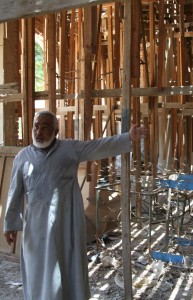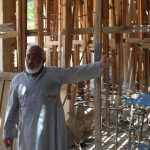(Morning Star News) – Christians worldwide just celebrated the birth of Jesus. For many in the West this was a festive season marked by worship services, gift-giving and time with family and friends. But for the church in the Middle East, fear of persecution cast a long, dark shadow over the Christmas holiday.
Oppression has marked the church since its birth. The book of Hebrews enjoins us to “remember those in prison as if you were their fellow prisoners, and those who are mistreated as if you yourselves were suffering.” Do we suffer with our brethren?
German pastor Dietrich Bonhoeffer, faced with the tyranny and horror of Nazism, famously said, “Silence in the face of evil is itself evil. Not to speak is to speak. Not to act is to act.”
And that is precisely what many in the church did, or failed to do, as Hitler unleashed his murderous plans. I recently encountered this haunting account by a German Christian in the book, “When a Nation Forgets God”:
“I lived in Germany during the Nazi Holocaust. I considered myself a Christian. We heard stories of what was happening to the Jews, but we tried to distance ourselves from it, because, what could anyone do to stop it?
“A railroad track ran behind our small church and each Sunday morning we could hear the whistle in the distance and then the wheels coming over the tracks. We became disturbed when we heard the cries coming from the train as it passed by…
“We knew the time the train was coming and when we heard the whistle blow we began singing hymns. By the time the train came past our church we were singing at the top of our voices. If we heard the screams, we sang more loudly and soon we heard them no more…
“I still hear that train whistle in my sleep. God forgive me; forgive all of us who called ourselves Christians and yet did nothing to intervene.”
The parallels are imperfect, but the sentiments are the same. Has our comfort led to complacency?
A phrase not often heard outside the majority Muslim world is “First the Saturday people, then the Sunday people.” The “Saturday people” are of course the Jews. Their once vibrant communities in countries throughout the region are now decimated. In 1948 there were roughly 150,000 Jews in Iraq; today, fewer than 10 remain. In Egypt, there were once as many as 80,000 Jews; now fewer than 100 remain.
It appears a similar fate awaits the ancient Christian community in these same lands. Iraq’s Christian population has fallen from as many as 1.4 million in 2003 to between 500,000 and 700,000 today. Churches have been targeted, believers kidnapped and families threatened if they stay. In October 2010, Islamist extremists laid siege on Our Lady of Salvation Catholic Church in Baghdad, killing more than 50 hostages and police and wounding dozens more.
In Egypt, with the ascent of the Muslim Brotherhood, Coptic Christians numbering roughly 8 million to 10 million are leaving in droves.
In the midst of devastating bloodshed in Syria, the Christian population there is particularly vulnerable. A recent ABC News story reported, “They [Christians] are fearful that Syria will become another Iraq, with Christians caught in the crossfire between rival Islamic groups.”
Over the span of a few decades, the Middle East, with the exception of Israel, was virtually emptied of Jews. The same thing will happen to the Christian community if the current trajectory holds true. And yet such stories receive scant attention in the mainstream media and, perhaps more strikingly, are rarely spoken of from our pulpits.
This is all the more striking given that the Middle East is the very cradle of Christendom. Consider Iraq: with the exception of Israel, the Bible contains more references to the cities, regions and nations of ancient Iraq than any other country. The patriarch Abraham came from a city in Iraq called Ur. Jacob spent 20 years in Iraq, and his sons (the 12 tribes of Israel) were born in northwest Iraq. A remarkable spiritual revival as told in the book of Jonah occurred in Nineveh. The events of the book of Esther took place in Iraq, as did the account of Daniel in the lion’s den. Furthermore, many of Iraq’s Christians still speak Aramaic, the language of Jesus.
How do we account for the indifference of the Church in the West?
The persecution plaguing the Middle East is no exception. Christians are targeted throughout the world in countries like China, Vietnam and Pakistan. If the faith community in the West isn’t engaged, are we surprised when government leaders turn a blind eye to matters of religious freedom?
Consider the following: bipartisan legislation to create a special envoy position at the State Department charged with advocating on behalf of religious minorities in the Middle East and South Central Asia overwhelmingly passed the House of Representatives over a year and a half ago. But it remained stalled in the Senate as a result of State Department opposition and the refusal of the chairman of the Senate Foreign Relations Committee, and presumptive secretary of state, John Kerry, to even hold a hearing on the legislation.
Just this week I reintroduced this legislation (H.R. 301) and remain committed to seeing it become law. I don’t pretend to think that a special envoy will single-handedly solve the problem, but it certainly can’t hurt to have a high-level person within the State Department bureaucracy who is exclusively focused on the protection and preservation of these ancient communities. Furthermore, to do nothing is simply not an option.
I have had the privilege of meeting individuals who boldly follow Jesus despite unbelievably hostile circumstances. Shabbaz Bhatti, Pakistan’s federal minister for minority affairs, the only Christian member of the cabinet and an outspoken critic of his country’s blasphemy laws, was one such man. On March 2, 2011 he was murdered, his car riddled with bullets, while leaving his mother’s house for work. In a video filmed shortly before his assassination (accessible on my Website at http://wolf.house.gov/bhattivideo), Bhatti appears to sense that the path he has chosen will come with a price.
When asked about the threats against his life, he said, “I believe in Jesus Christ, who has given his own life for us. I know what is the meaning of [the] cross. And I am following the cross. And I am ready to die for a cause.” And so he did.
The book of Proverbs tells us to “Speak up for those who cannot speak for themselves …” Bhatti can no longer speak. The Chinese bishop under house arrest cannot speak. The North Korean believer enslaved in the gulag can’t speak. The Iraqi nun fearing for her life cannot speak.
Will we be their voice? I posed this very question in a letter to more than 300 U.S. faith leaders earlier this month and urged them to act.
The church globally is under assault. Our response must not be to simply sing more loudly, thereby drowning out the cries for help from our brothers and sisters.
Rep. Frank R. Wolf (R-Va.) is co-chair of the U.S. Congress Tom Lantos Human Rights Commission.
###
© 2013 Morning Star News. Articles may be reprinted with credit to Morning Star News.
Morning Star News is a 501(c)(3) non-profit corporation whose mission is to inform those in the free world and in countries violating religious freedom about Christians worldwide who are persecuted for their faith. For free subscription or to make tax-deductible donations, contact [email protected], or send check to Morning Star News, 24310 Moulton Parkway, Suite O # 157, Laguna Hills, CA 92637, USA.
- Egyptian clergyman amid church building damaged in Islamist attack. (Morning Star News photo)


